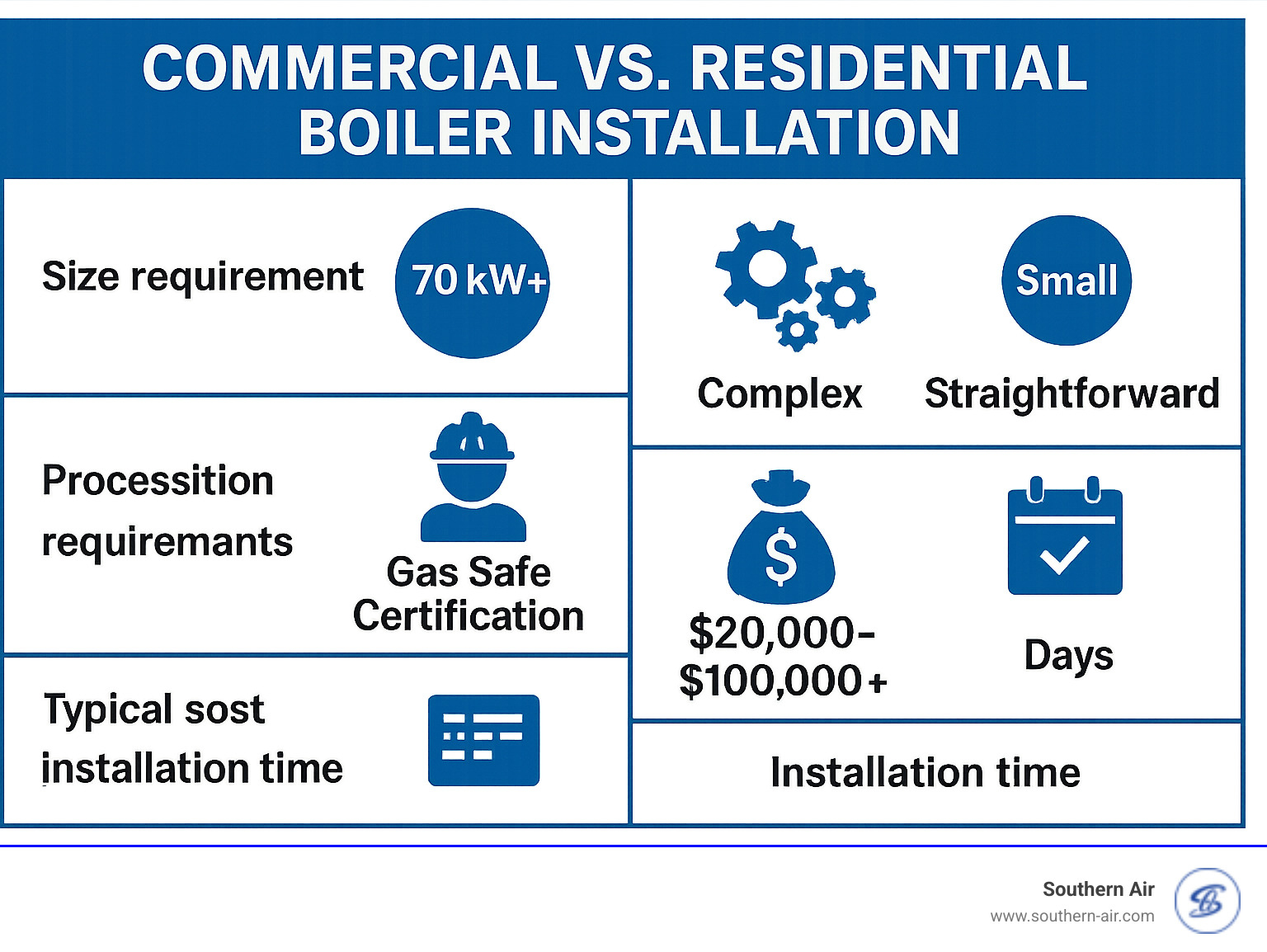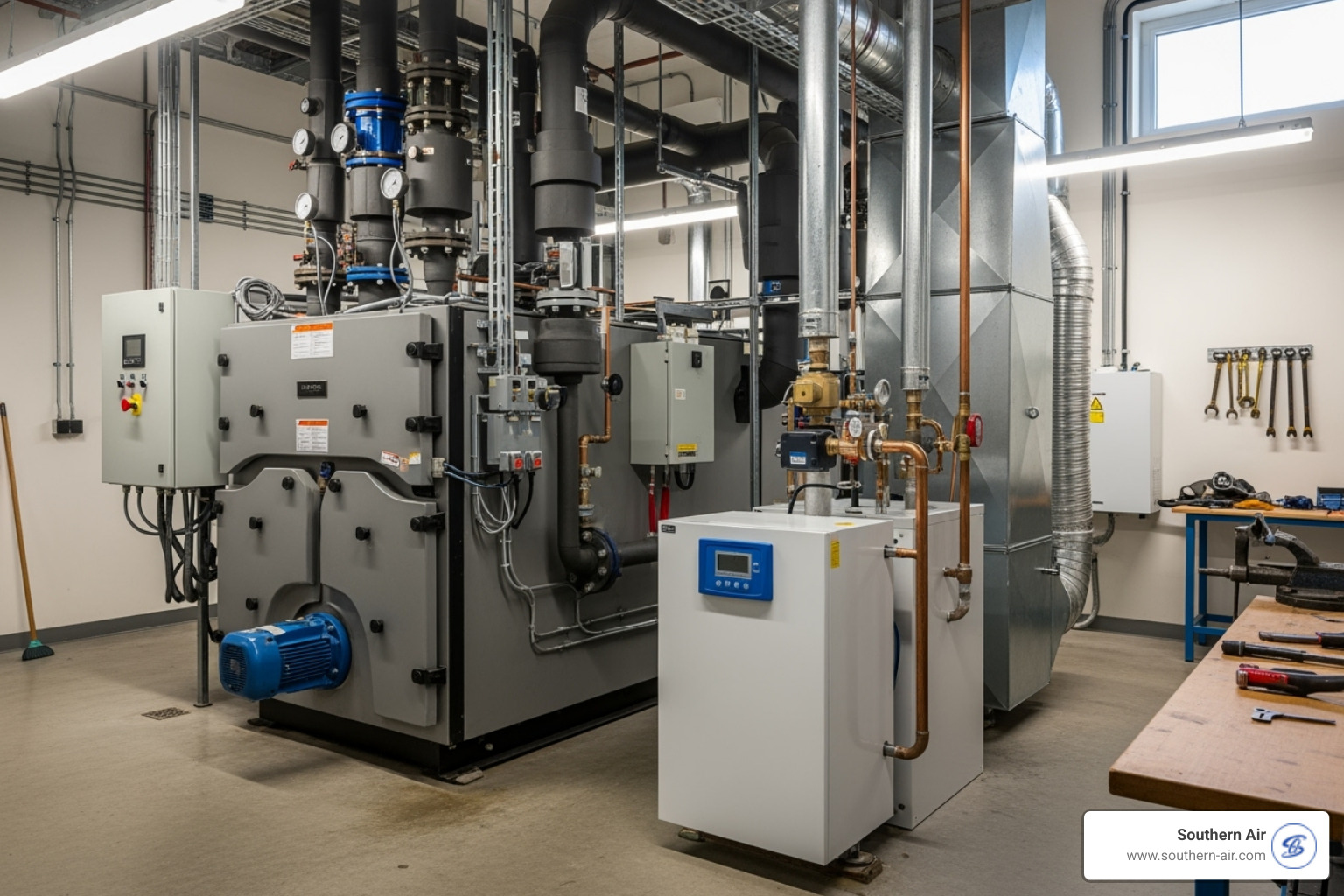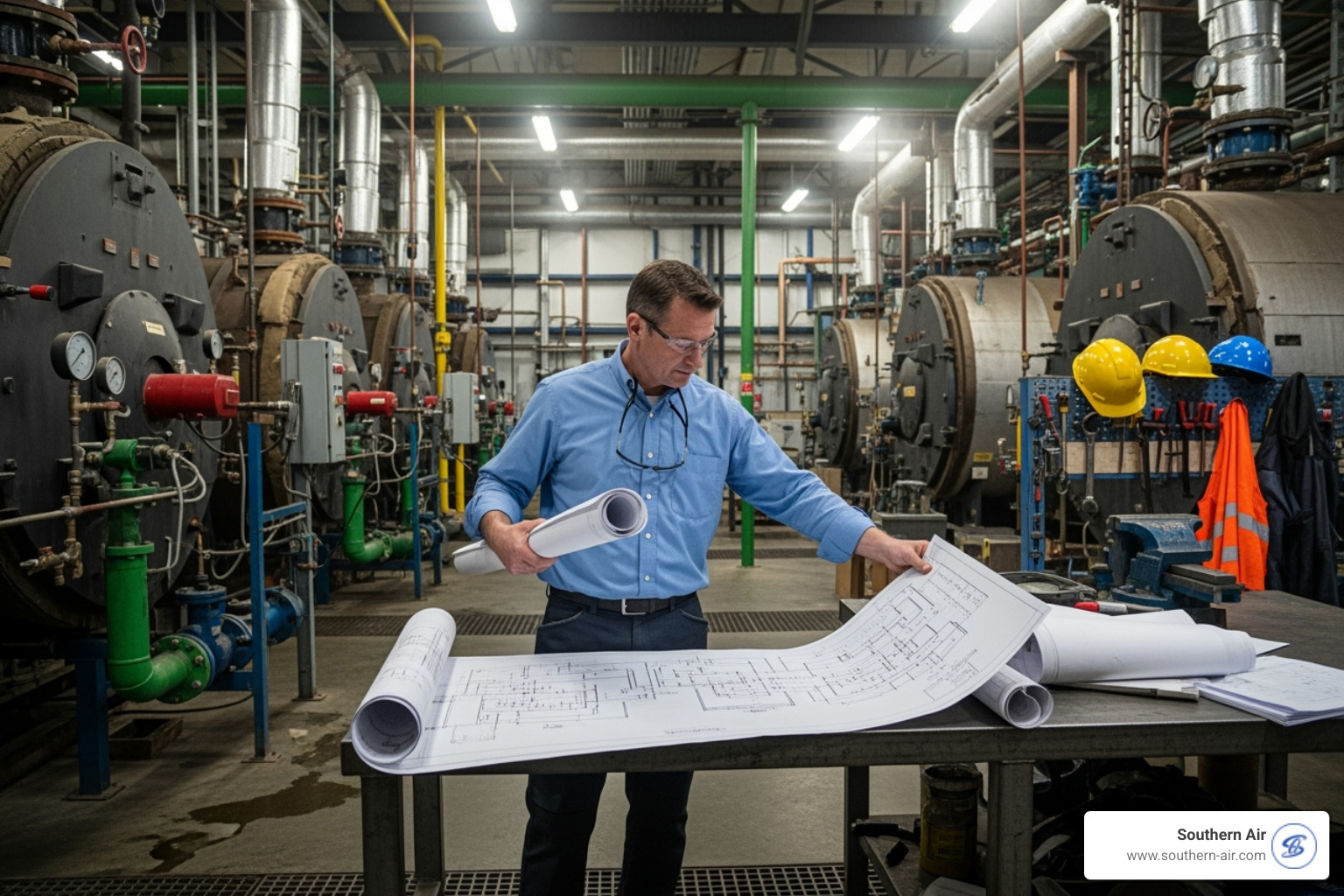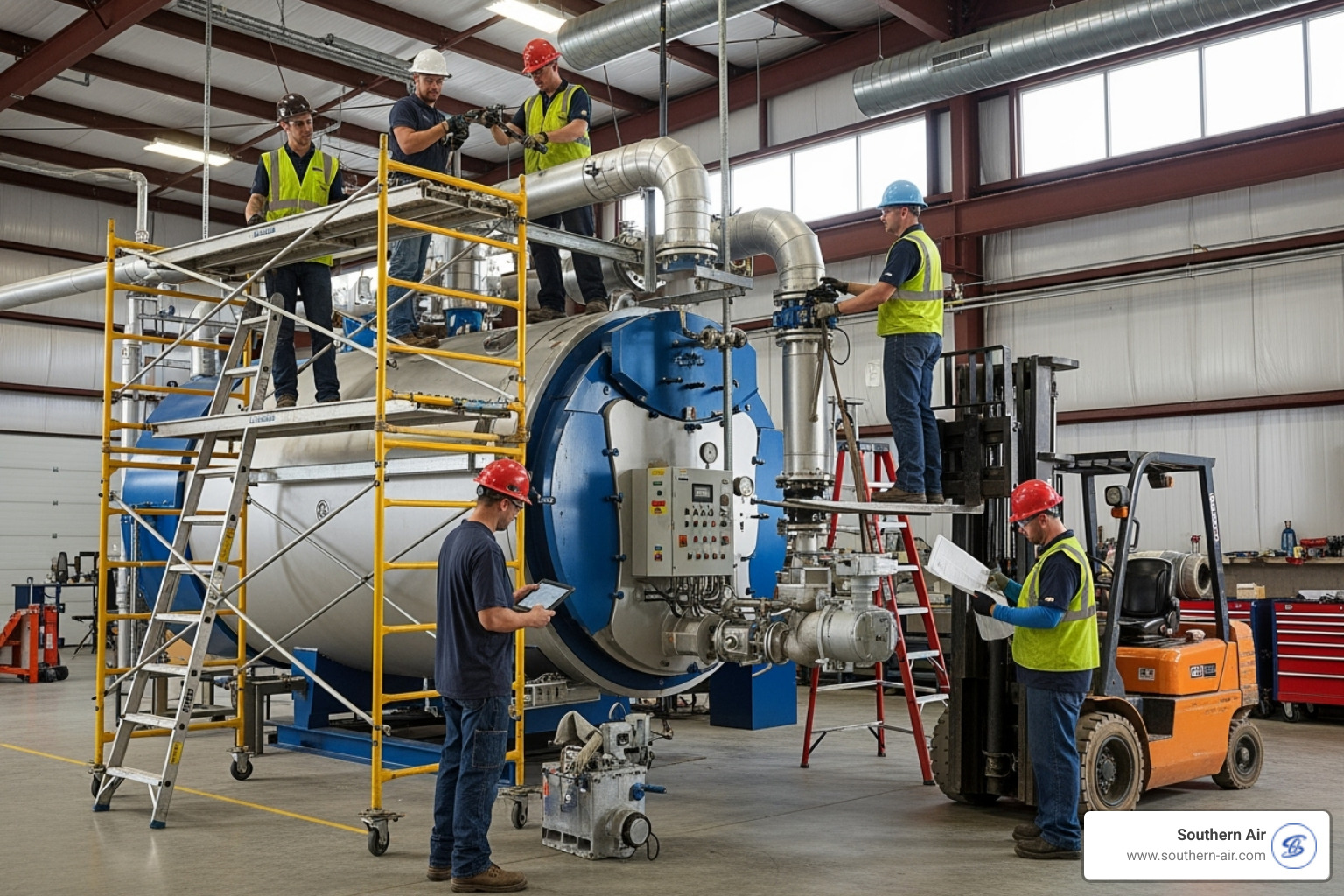Why Professional Commercial Boiler Installation Matters
Commercial boiler installation is a complex task requiring specialized expertise and adherence to strict safety regulations. Unlike residential units, commercial boilers are designed for significantly higher heating demands and more stringent operational requirements.
Key aspects of commercial boiler installation include:
- Size classification: Boilers rated 70kW or higher are considered commercial units
- Professional requirements: Only Gas Safe registered engineers should perform installations
- Timeline: Direct replacements take days to weeks; complex installations may take longer
- Investment range: Commercial installations typically cost $20,000 to $100,000+
- Compliance: Must meet local building codes, ventilation requirements, and safety standards
As the backbone of heating in offices, hospitals, schools, and industrial facilities, commercial boilers are built to provide consistent heat and hot water under demanding conditions.
The process includes site assessment, system design, removal of old equipment, installation, testing, and commissioning. Each step needs careful coordination to minimize downtime and ensure peak performance.
Understanding this process is key, whether you're replacing an aging, inefficient system or installing a boiler in a new facility. It helps you make informed decisions and work effectively with your contractor.

Understanding Your Boiler: Commercial vs. Residential
The difference between a residential boiler and one powerful enough to heat a hospital is immense, and it goes far beyond size. This is commercial boiler installation.

Commercial boilers are workhorses rated at 70kW or higher. Built for continuous operation, they manage multiple heating zones and hot water demands across large buildings, handling loads far beyond residential capacity. The complexity is also far greater, as commercial systems must often provide heat for hundreds of people and hot water for industrial processes.
Warning signs that your boiler is failing include leaks, rising energy bills signaling poor efficiency, frequent shutdowns, and unusual noises like banging or gurgling. These indicate internal problems that need attention. Inadequate heating is a clear sign of failure. Ignoring these signals leads to bigger problems and costlier repairs. Learn more in our guide to Common Issues Boiler Repair Services.
Key Differences Explained
The gap between residential and commercial systems is clear when examining the details:
- Output Capacity: Commercial boilers range from 70kW to over 2,500kW, dwarfing smaller residential units.
- Physical Size: Commercial boilers require dedicated plant rooms, though modern designs are more compact.
- Component Durability: Commercial systems use heavy-duty parts built for constant, demanding operation.
- Cost: Residential systems cost a few thousand to mid-teens, while commercial installations start around $20,000 and can exceed six figures.
When Is It Time for a Replacement?
Consider a replacement when you notice these signs:
- Boiler Age: Efficiency declines after 15-20 years, even with good maintenance. Most commercial boilers last 15 to 30 years.
- Declining Efficiency: If energy bills are climbing, your boiler is working harder to produce the same heat. An old system can lose 25% of its heat through the flue.
- Frequent Repairs: If service calls and repair costs are mounting, a replacement is often more economical.
- Obsolete Parts: When replacement parts become hard to find, downtime and costs increase. Modern systems have better parts availability.
- Compliance with Regulations: New standards may require replacing systems with poor energy ratings to avoid fines and improve safety.
If these signs are familiar, a new, high-efficiency system can pay for itself through lower operating costs and improved reliability. For expert guidance, explore our Boiler Replacement Lynchburg VA services.
Selecting the Right Boiler for Your Property
Choosing the right commercial boiler means matching it to your building's unique heating needs, energy profile, and operational demands. A system for a small office won't suffice for a large manufacturing facility.

A successful commercial boiler installation starts with a thorough assessment of your requirements. Our experience since 1946 shows that this upfront planning saves time and money, ensuring you invest in a system that provides efficient and reliable comfort for the next 15 to 30 years. For more on how technology is improving heating, see Modern HVAC Technology Advancements.
Types of Commercial Boilers
Commercial boilers come in several types, each with specific strengths:
- Gas Boilers: Popular for their clean, efficient, and cost-effective operation where natural gas is available. Modern condensing gas boilers can reach up to 98% efficiency.
- Electric Boilers: Offer the cleanest on-site operation with no emissions and minimal maintenance, achieving nearly 99% efficiency. However, operating costs can be higher due to electricity prices.
- Oil Boilers: A dependable solution where natural gas is unavailable, though they require on-site fuel storage and more maintenance.
- Fire-Tube Boilers: A simpler design where hot gases pass through tubes surrounded by water. They are suitable for lower-pressure applications and achieve 80-85% efficiency, which can be boosted with an economizer.
- Water-Tube Boilers: Robust units for high-pressure, high-temperature industrial applications, where water flows through tubes surrounded by hot gas. Efficiency is similar to fire-tube models and can also be improved with economizers.
- Condensing Boilers: A game-changer in efficiency, these systems capture waste heat from flue gases to achieve ratings over 90%. The initial investment is offset by long-term energy savings.
| Boiler Type | Efficiency (Approx.) | Fuel Cost (Relative) | Maintenance (Relative) |
|---|---|---|---|
| Gas (Non-Condensing) | Low to Mid 80s | Medium | Medium |
| Gas (Condensing) | High 90s | Medium | Medium to High |
| Electric | ~99% | High | Low |
| Oil | Low to Mid 80s | Medium to High | High |
Key Factors for Your Commercial Boiler Installation
Your boiler selection should be guided by these critical factors:
- Building Size and Layout: The building's volume determines the required heat output (BTU/kW). An improperly sized boiler will operate inefficiently.
- Insulation Quality: Better insulation reduces heat loss, potentially allowing for a smaller, more efficient boiler.
- Local Climate: We consider historical weather data for areas like Lynchburg, VA to ensure your system can handle peak demand.
- System Integration: The new boiler must work seamlessly with existing piping, distribution networks, and controls.
- Modern Controls: Advanced thermostats and controls offer precise temperature management, zone heating, and smart scheduling to reduce waste and improve comfort.
For more on heating options in our service area, visit our Heating Systems Lynchburg VA page.
The Commercial Boiler Installation Process: A Step-by-Step Guide
A commercial boiler installation is a multi-stage process that requires careful coordination to ensure a successful outcome with minimal disruption. It's more than just swapping equipment; it's a comprehensive upgrade to your building's heating system.

The process unfolds in carefully managed stages:
- Site Assessment & System Design: We start by examining your current setup and building needs to design the ideal heating solution and create detailed plans and safety assessments.
- Removal and System Flush: The old unit is carefully disconnected and removed. We then perform a crucial system flush to clean existing pipework of sludge and debris that could harm the new boiler.
- New Boiler Installation: Our certified technicians position and connect the new unit, verifying every fuel line, water supply, and safety system.
- Testing and Commissioning: We conduct rigorous tests on pressures, temperatures, and exhaust gases. During commissioning, we fine-tune controls and calibrate settings for optimal performance.
- Handover and Training: We provide comprehensive training, warranty documentation, and ongoing support. Learn why this professional approach matters at Expert HVAC Installation Matters.
Safety, Compliance, and Regulations
Safety is integrated into every decision. Our commitment starts with qualified professionals. Only Gas Safe registered engineers handle gas-fired installations, while OFTEC certified technicians manage oil systems. These certifications represent extensive training and adherence to the latest safety standards.
We expertly manage local building codes, obtaining permits and coordinating inspections to ensure full compliance. Ventilation and exhaust systems are critically important for safety, and we ensure your facility meets all requirements, preventing the buildup of harmful gases. We also integrate the new boiler with building safety systems like fire suppression and carbon monoxide detectors. For more on our safety commitment, see Leading the Way in Construction Safety.
Timeline and Downtime for a Commercial Boiler Installation
The timeline varies based on project complexity. A direct replacement in the same location with good pipework may take several days to two weeks. Complex installations involving relocation, new piping, or custom systems can take several weeks or months.
We excel at minimizing disruption by scheduling work during off-peak hours or planned shutdowns. For facilities that require continuous heating, rental boilers can provide temporary service. In multi-boiler facilities, phased rollouts allow us to replace one unit at a time without a complete shutdown. For urgent needs, our team is ready to respond. Learn more about our HVAC Emergency Repair Lynchburg VA services.
Commissioning and Handover
This final stage ensures your system is finely tuned for decades of reliable service. We conduct performance tests to verify all components function as designed, including comprehensive pressure and temperature checks. Flue gas analysis confirms clean, efficient combustion that meets environmental standards. System balancing ensures even heat distribution across all zones.
Finally, user training empowers your staff to operate the system confidently. We provide full warranty documentation and operational manuals, protecting your investment and ensuring our commercial boiler installation meets your long-term needs.
Financials, Maintenance, and Long-Term Value
A new commercial boiler installation is a major financial decision, but the long-term benefits often provide a significant return. While the upfront cost is considerable, the investment can transform your operations and bottom line.
Calculating ROI
Return on investment comes from several areas:
- Energy Savings: Modern high-efficiency boilers can reduce fuel consumption by 20-30% or more, leading to immediate and substantial savings on energy bills.
- Reduced Repair Costs: A new, reliable system eliminates the frequent and unpredictable repair bills associated with an aging boiler.
- Financial Incentives: You may qualify for tax credits, natural gas rebates, or local utility incentives that lower the net cost of your investment.
We understand the initial investment can be a challenge, which is why we offer flexible Financing options to make the upgrade more manageable.
The Importance of Regular Maintenance
Consistent, professional maintenance is the key to prolonging boiler life and protecting your investment. A well-maintained boiler can easily meet or exceed its 15-30 year expected lifespan.
An annual combustion adjustment by a trained technician can improve efficiency by 10-15%, directly lowering your energy bills. Most importantly, regular maintenance helps prevent breakdowns, allowing us to spot and fix minor issues before they become costly emergencies. Our service agreements provide predictable costs and ensure your system receives the year-round attention it needs to operate at peak performance. For details, visit Boiler Maintenance Lynchburg VA.
After-Sales Support and Warranty
Our relationship doesn't end with the installation. We provide comprehensive after-sales support to be your long-term heating partner. Our support includes:
- 24/7 Emergency Service: Our rapid response team is always ready to address critical issues and get your system back online.
- Technical Support: Expert guidance is just a phone call away for operational questions or troubleshooting.
- Parts Availability: We ensure access to genuine OEM parts for fast, effective repairs that preserve system longevity.
- Manufacturer Warranty: We handle all registration to ensure your equipment is fully covered.
- Labor Guarantee: We stand behind our installation work, giving you complete peace of mind.
For ongoing needs, our team at Boiler Service Lynchburg VA is ready to help.
Frequently Asked Questions about Boiler Installation
We've gathered answers to the most common questions we receive about commercial boiler installation to help you make informed decisions.
How much does a new commercial boiler cost?
The cost of a commercial boiler installation varies widely based on boiler type, capacity, and system complexity. A direct replacement is less expensive than a complex new installation with infrastructure upgrades. Generally, costs range from $20,000 to over $100,000. A professional site assessment is necessary for an accurate quote.
How long does a commercial boiler last?
A properly installed and maintained commercial boiler is built for longevity, typically lasting 15 to 30 years. Lifespan depends heavily on the quality of the installation, the consistency of professional maintenance, and the operating environment. Regular care is the best way to maximize your boiler's service life.
How can I improve my boiler's efficiency?
Annual maintenance is the most cost-effective way to boost efficiency. Professional tuning of the combustion process and cleaning heat exchangers can improve performance by 10-15%. For the most significant gains, upgrading to a modern condensing boiler is the best option, with efficiency ratings often exceeding 90%. Other improvements include upgrading controls and improving building insulation.
Your Partner for Reliable Heating Solutions
We hope this guide clarifies the commercial boiler installation process. This critical system keeps your business running, and professional installation is essential for safety, efficiency, and long-term value. From selecting the right unit to expert installation and ongoing maintenance, every step requires specialized expertise.
Since 1946, Southern Air has been a trusted partner for businesses, providing reliable heating solutions. We don't just install your boiler and disappear; we offer long-term support, including 24/7 emergency service and comprehensive maintenance.
Don't leave your heating system to chance. If you're considering a new boiler, planning a new facility, or seeking more efficient options, we're ready to help.
Ready to take the next step? Contact us for your expert boiler installation in Lynchburg, VA to discuss your needs and secure a successful investment in your business's future.
